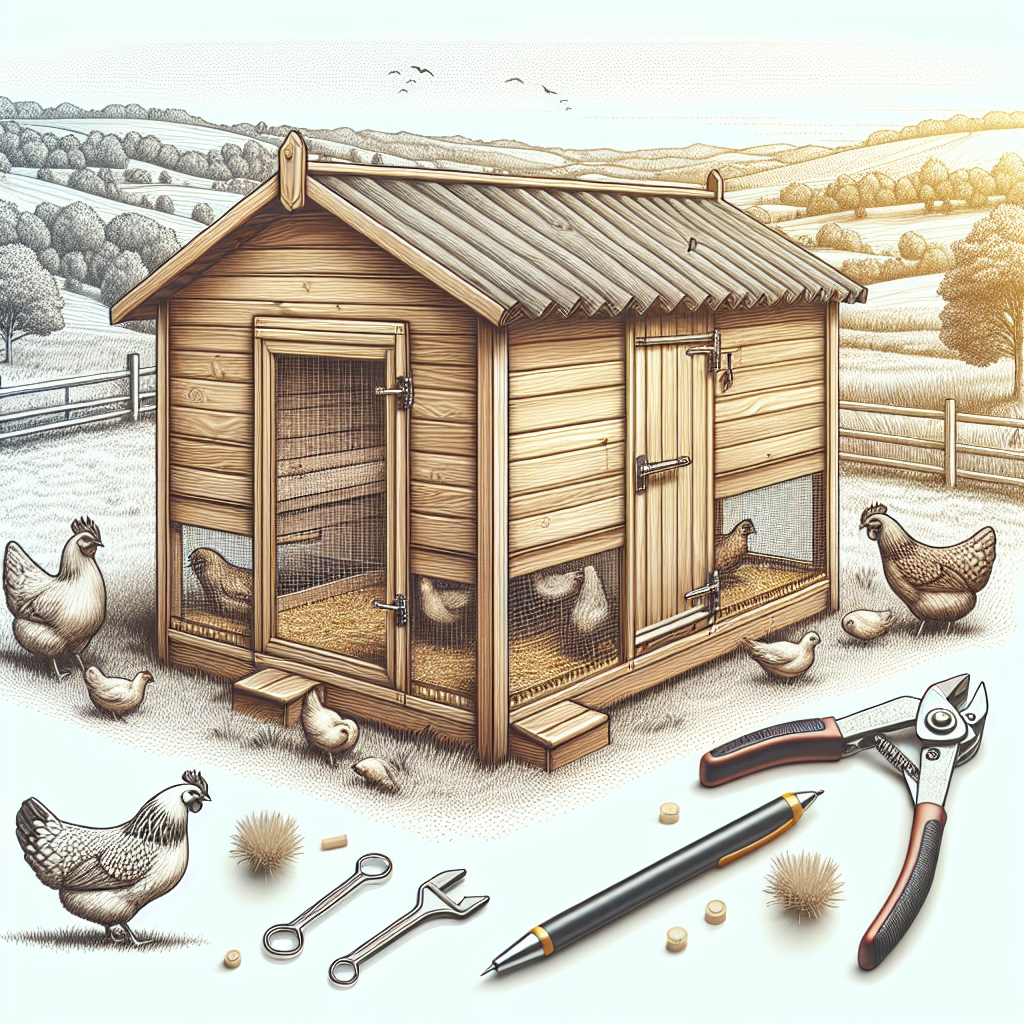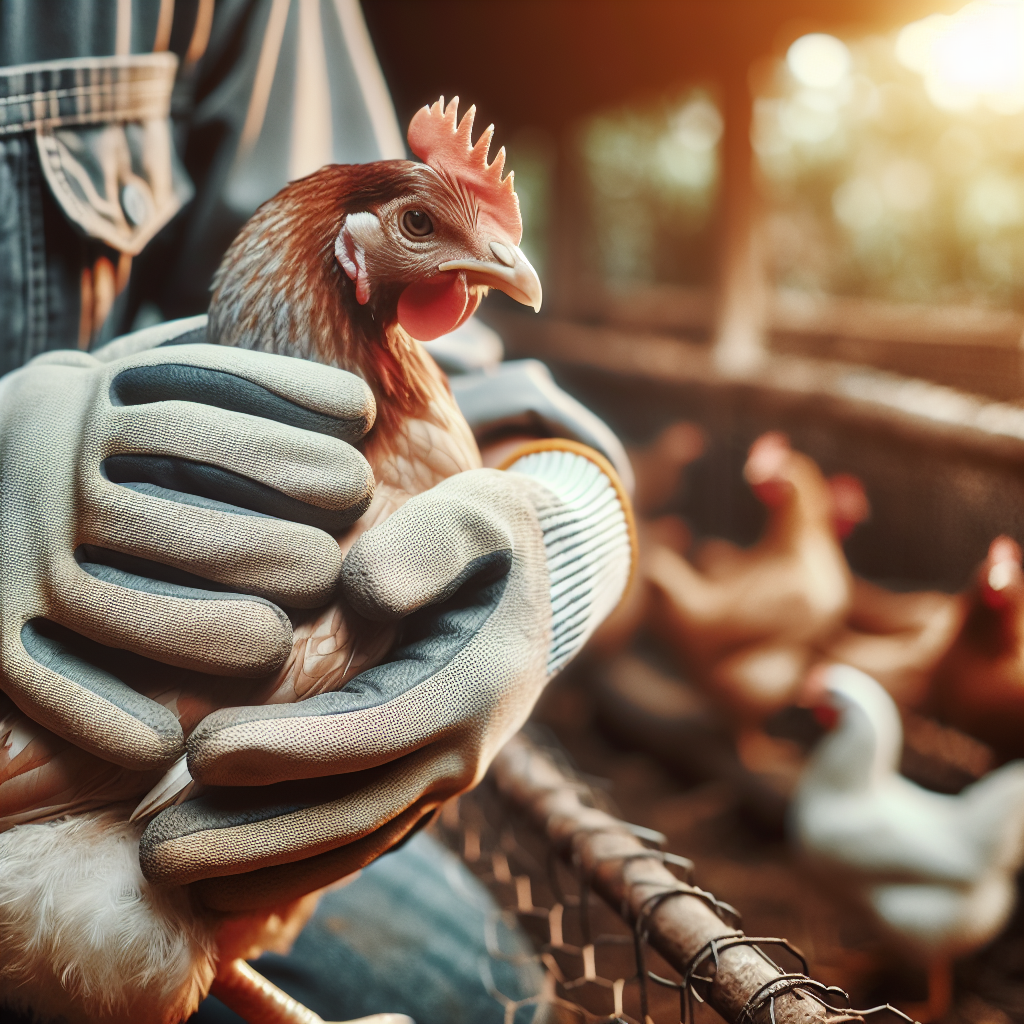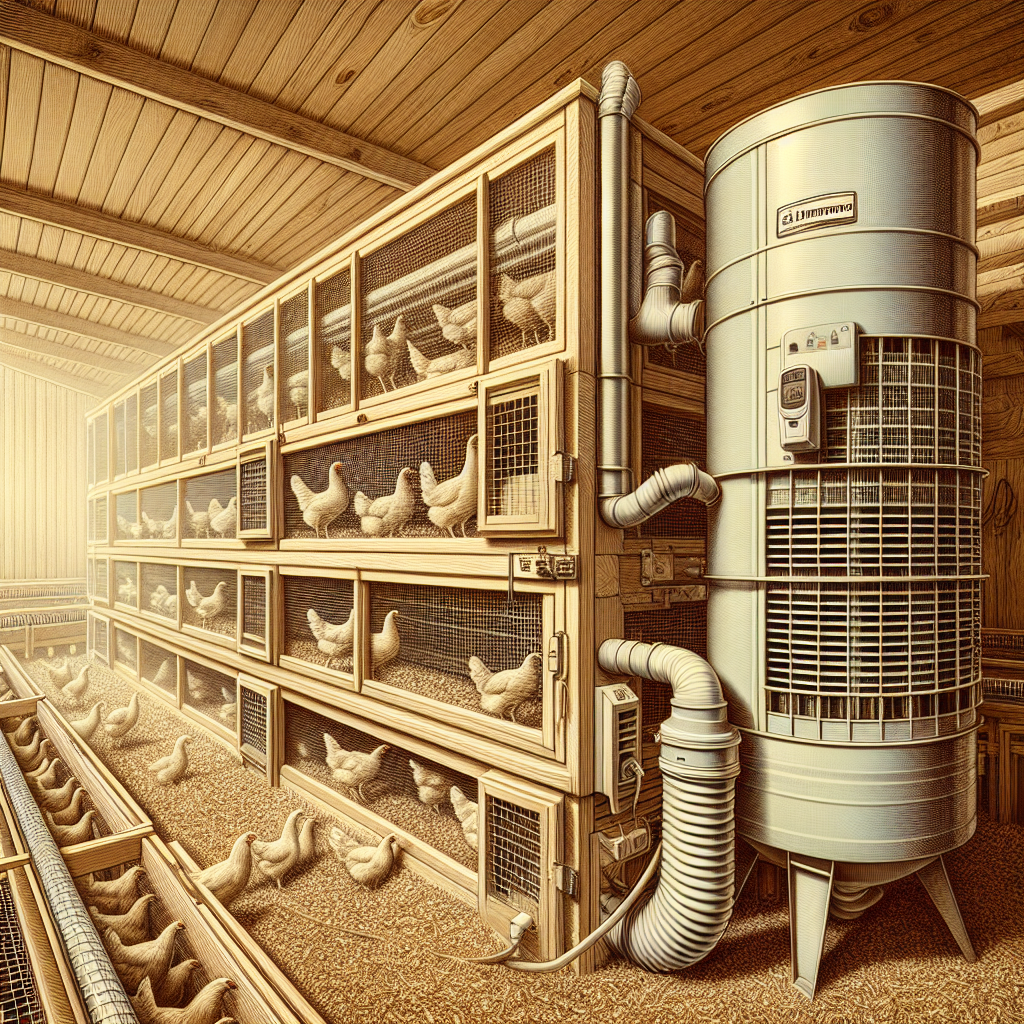In this article, we will explore the topic of maintenance considerations for mobile or portable coops. Whether you’re a seasoned chicken farmer or just starting out, taking care of your feathered friends is essential for their health and well-being. However, when it comes to mobile or portable coops, there are unique factors to consider. We’ll discuss the importance of regular cleaning, structural integrity, and the impact of weather conditions. By the end of this article, you’ll have a better understanding of the specific maintenance requirements for these types of coops and how to keep your chickens happy and healthy.
Factors to Consider Before Building a Mobile or Portable Coop
Location
When considering building a mobile or portable coop, the first thing you need to consider is the location. You want to choose a spot that is convenient for you to access and maintain. Consider factors such as proximity to your house, availability of fresh water supply, and accessibility for feeding and cleaning purposes. Additionally, think about the terrain and make sure the area is level and free from potential hazards or obstacles that could pose a risk to the coop’s stability.
Size
The size of your mobile or portable coop is another important factor to consider. It should provide enough space for your flock to comfortably move around and engage in their natural behaviors. Remember, chickens need space to roam, scratch the ground, and flap their wings. A minimum of 4 square feet per bird is recommended to prevent overcrowding. However, if you have larger breeds or plan to expand your flock, you may need to provide more space.
Materials
Choosing the right materials for your mobile or portable coop is crucial for its durability and longevity. Opt for materials that are lightweight yet sturdy, such as quality wood or metal frames. Consider using weather-resistant materials that can withstand the elements, especially if you plan to move the coop frequently. Additionally, ensure that all materials used are non-toxic to your birds, as they may peck at the coop from time to time.
Accessibility
Another factor to consider is the accessibility of your coop. It should be easy for you to enter and exit the coop for regular maintenance, such as cleaning and egg collection. Consider adding a large access door or multiple smaller doors to make it convenient for you to reach all areas of the coop. Additionally, think about how you will transport the coop if it is portable. Make sure it can fit through gates, narrow paths, or into a vehicle if necessary.
Ventilation
Proper ventilation is essential for the health and well-being of your flock. Ensure that your mobile or portable coop has sufficient openings for fresh air circulation. Good ventilation helps remove excess moisture, ammonia, and pathogens from the coop, preventing respiratory issues in your birds. Consider adding windows with mesh screens or vents near the roof to allow for natural airflow. However, make sure to design the openings in a way that can be easily closed or covered during extreme weather conditions to protect your birds.
Maintaining the Structure of the Coop
Inspecting for Wear and Tear
Regular inspections of your mobile or portable coop are crucial to identify any signs of wear and tear. Check for loose or damaged parts, such as loose screws, cracked panels, or warped floorboards. Inspect the roof for any leaks that could lead to water damage. Additionally, pay attention to the structural integrity of the coop, ensuring that it remains stable and secure. By catching and addressing any maintenance issues early on, you can prevent further damage and ensure the safety of your chickens.
Repairing Damages
If you do notice any damages during your inspections, it is important to repair them promptly. Replace any broken or rotten parts, reinforce weakened areas, and fix any leaks. Use appropriate materials and tools for repairs to ensure the durability and longevity of your coop. Regular maintenance and timely repairs will help extend the lifespan of your mobile or portable coop, saving you time and money in the long run.
Ensuring Proper Sanitation and Hygiene
Regular Cleaning and Disinfection
A clean and hygienic coop is essential for the health of your flock. Regularly cleaning and disinfecting the coop will help prevent the spread of diseases and parasites. Remove any wet bedding, droppings, or other debris from the coop’s interior and nesting boxes. Scrub and rinse the surfaces with a mild disinfectant, making sure to follow the manufacturer’s instructions. Allow the coop to dry thoroughly before adding fresh bedding. Regular cleaning will create a comfortable and safe environment for your birds to thrive.
Rodent and Pest Control
Keeping pests and rodents away from your mobile or portable coop is crucial to prevent damage and disease transmission. Seal any gaps or openings that could serve as entry points for pests. Consider using wire mesh or hardware cloth to reinforce areas prone to rodent activity. Regularly inspect for signs of infestations or damage caused by pests, such as chewed wires or droppings. Implement appropriate pest control measures, such as traps or natural deterrents, to maintain a pest-free environment for your chickens.
Proper Waste Disposal
Proper waste disposal is an important aspect of maintaining sanitation and hygiene in your coop. Collect and dispose of chicken manure regularly to prevent a buildup that could lead to unpleasant odors and potential health risks. Consider composting the waste as a sustainable option for fertilizing your garden or yard. However, make sure to follow safe composting practices to ensure pathogens and parasites are properly eliminated. Regular waste management will contribute to a cleaner and healthier environment for your flock.
Managing Temperature and Climate Control
Insulation
Insulating your mobile or portable coop is crucial to regulate temperature and protect your birds from extreme weather conditions. Proper insulation helps keep the coop warm in the winter and cool in the summer. Consider adding insulation materials, such as foam boards or reflective insulation, to the walls and roof. Ensure that the insulation is properly installed and covers all areas to effectively trap heat or maintain coolness. By providing a comfortable and stable climate, you will ensure the well-being of your flock throughout the year.
Heating and Cooling Systems
In addition to insulation, you may need to provide additional heating or cooling systems depending on your climate. In colder regions, consider using heat lamps or radiant heaters to keep the coop warm during winter months. Ensure that any heating devices are securely installed and placed away from any flammable materials to prevent potential fire hazards. In hot climates, consider providing shade and proper ventilation to keep the coop cool. Use fans or misting systems to help lower the temperature and reduce heat stress in your birds.
Ensuring Adequate Lighting
Natural Light Considerations
Natural light plays a vital role in the overall well-being and productivity of your birds. When planning the placement of your mobile or portable coop, take into consideration the availability of natural light. Ideally, the coop should be positioned to receive natural sunlight throughout the day. Exposure to sunlight helps regulate the birds’ internal clocks and supports vitamin D synthesis. Consider adding windows or skylights to maximize natural light inside the coop. Natural light not only benefits the birds but also creates a pleasant environment for you when tending to your flock.
Artificial Lighting Options
In addition to natural light, you may need to provide artificial lighting in your mobile or portable coop, especially during the shorter days of winter. Supplemental lighting can help maintain egg production and prevent mood disturbances in your birds. Use energy-efficient LED bulbs to provide sufficient lighting, ensuring that it is evenly distributed throughout the coop. Implement a timer system to mimic natural daylight hours and maintain a consistent lighting schedule. Proper lighting will encourage healthy and productive behavior in your chickens.
Providing Sufficient Nesting and Roosting Spaces
Nest Boxes
Nest boxes are essential for your hens to lay eggs comfortably and securely. When designing your mobile or portable coop, make sure to include sufficient nest boxes that are accessible for both you and your birds. Aim for one nest box per every 4-5 hens. Provide bedding materials, such as straw or wood shavings, to make the nesting boxes inviting and comfortable. Regularly inspect and clean the nest boxes to ensure cleanliness and freshness, which will contribute to the quality of your eggs.
Roosting Perches
Chickens have a natural instinct to perch, which provides them with a sense of security and helps regulate their body temperature. Ensure that your mobile or portable coop has enough roosting perches for your flock. The perches should be at least 8-12 inches long and positioned higher than the nesting boxes. Use sturdy materials, such as wooden dowels or branches, that are comfortable for your birds to grip. Regularly clean the perches to prevent the buildup of droppings and to maintain a hygienic environment for your flock.
Maintaining Water and Feed Systems
Clean and Fresh Water Supply
Access to clean and fresh water is essential for the health and hydration of your birds. Regularly clean and refill the water containers or troughs in your mobile or portable coop to avoid contamination. Ensure that the water is easily accessible for your birds and kept at an appropriate height to prevent spillage or soiling. Check the water supply regularly for any signs of algae growth or debris. By providing a constant supply of clean water, you will promote the overall well-being of your flock.
Efficient Feed Storage and Distribution
Efficient feed storage and distribution systems are crucial to ensure your birds receive the proper nutrition they need. Invest in feeders that are designed to minimize waste and protect the feed from pests or moisture. Regularly inspect and clean the feeders to remove any mold or spoiled feed. Consider implementing a feeding schedule to avoid over- or underfeeding your flock. Proper feeding practices will help maintain the health and productivity of your birds while minimizing expenses.
Secure Fencing and Enclosure
Preventing Predators
One of the main challenges of keeping chickens in a mobile or portable coop is protecting them from predators. Ensure that your coop has secure fencing and enclosure to prevent unauthorized access by predators. Use materials such as heavy-duty mesh wire or hardware cloth to prevent digging, climbing, or squeezing through. Regularly inspect the fencing for any signs of damage or gaps. Consider reinforcing the bottom of the fencing with an apron of wire mesh to prevent burrowing predators. Protecting your birds from potential threats will provide them with a safe and secure environment.
Regularly Inspecting Fencing
Regularly inspecting the fencing of your mobile or portable coop is essential to maintain its structural integrity. Check for any signs of wear, such as rust, loose wires, or broken posts. Repair any damages promptly to prevent potential breach by predators or escape of your chickens. Additionally, look out for any vegetation or debris that may be accumulating along the fence line, as they can serve as hiding places for predators. By maintaining a sturdy and secure fence, you can ensure the safety of your flock.
Monitoring Health and Well-being of the Birds
Regular Health Checks
Regular health checks are vital to monitor the overall well-being of your birds. Keep an eye out for any changes in behavior, appetite, or appearance. Check for signs of injuries, infections, or parasites. Inspect their feathers, eyes, beaks, and legs for any abnormalities. If you notice anything concerning, consult a veterinarian experienced with poultry. By catching and addressing health issues early on, you can prevent the spreading of diseases and ensure the health of your entire flock.
Isolation of Sick Birds
If you have a mobile or portable coop, it is important to have a system in place for isolating sick birds. Set up a separate area within the coop or have a separate quarantine coop to house birds that show signs of illness. Isolating sick birds prevents the spread of diseases and allows you to provide separate care and treatment. Make sure the isolation area is properly ventilated, has its own food and water supply, and is regularly cleaned to prevent cross-contamination.
Biosecurity Measures
Implementing biosecurity measures is essential to protect your flock from various diseases and pathogens. Limit access to your mobile or portable coop to only necessary personnel. Practice proper hygiene by washing your hands and disinfecting footwear before entering the coop. Restrict contact with other flocks and refrain from sharing equipment or supplies without proper disinfection. By implementing strict biosecurity practices, you can minimize the risk of introducing or spreading diseases among your birds.
Ensuring Safety and Easy Mobility
Sturdy and Secure Design
When building a mobile or portable coop, prioritize a sturdy and secure design to ensure the safety of your birds during transportation. Use high-quality materials and reinforced construction methods. Pay close attention to the joints, connectors, and hinges to ensure they can withstand movement and vibrations without compromising the integrity of the coop. Regularly inspect these components for any signs of wear or damage. A sturdy and secure design will provide you with peace of mind during the transportation of your chickens.
Proper Hitching or Locking Mechanism
If your coop is mobile, make sure it has a proper hitching or locking mechanism for secure transportation. This will prevent the coop from unexpectedly opening or falling apart during movement. Test the hitching or locking mechanism regularly to ensure it functions properly. Familiarize yourself with its operation and take necessary precautions, such as using additional straps or locks, for added security. Properly securing your mobile coop will prevent accidents and ensure the safety of your chickens.
Wheel Maintenance
If your mobile coop has wheels for easy mobility, regular wheel maintenance is necessary to ensure smooth movement. Check the tires for any signs of wear or damage, such as punctures or worn-out treads. Inflate the tires to the appropriate pressure as recommended by the manufacturer. Lubricate any moving parts, such as axles or bearings, to reduce friction and enhance mobility. By maintaining the wheels of your mobile coop, you will ensure a hassle-free and safe transportation experience.
In conclusion, building and maintaining a mobile or portable coop requires careful consideration of various factors. From location and size to ventilation and mobility, every aspect plays a crucial role in providing a safe and comfortable environment for your chickens. Regular inspections, proper sanitation practices, and diligent monitoring of your flock’s health are essential in ensuring their well-being. By following these guidelines and prioritizing maintenance, you can enjoy the convenience and flexibility of a mobile or portable coop while keeping your birds happy and healthy.




